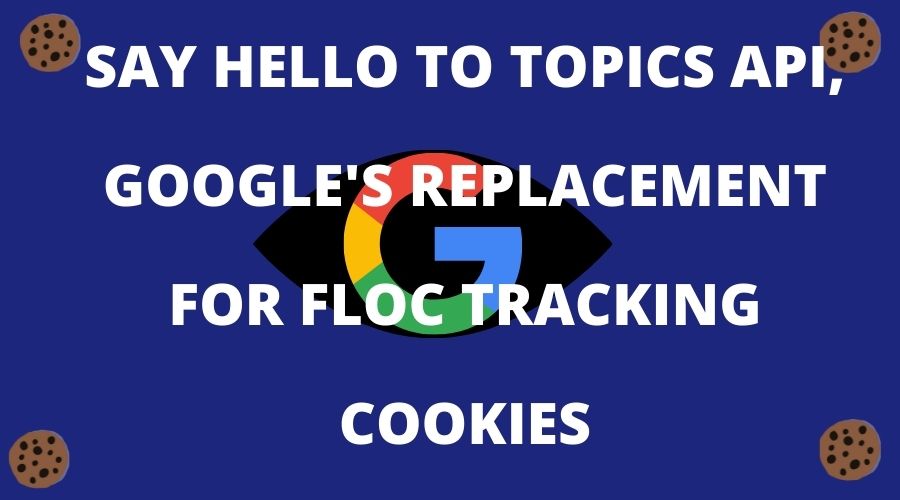
This post was most recently updated on May 31st, 2024
At the beginning of 2021, Google came up with FLoC i.e. Federated Learning of Cohorts to replace third-party cookies (the reason why you see relevant ads on websites).
Post the feedback and criticism FLoC received, Google’s Privacy SandBox team proposed the Topics API as the new solution for interest-based targeting. Topics API groups users’ browsing habits into 350 categories.
Compared to its predecessor FLoC API, the Topics API makes use of on-device machine learning. It is unclear how Topics API compares to third-party cookies currently, but Google is in a hurry for the best solution before 2023 after its FLoC scheme flopped.
When Amazon and WordPress turned off Google FLoC because of privacy concerns, they knew it was high time for an upgrade. Topics API is the new FLOC 2.0 where Google plans to fix its mistakes and also launch a developer trial of Topics API and user controls in Chrome soon.
Based on trial and feedback, the final design of the user controls & other technical aspects of Topics API will be determined.
Contrary to third-party cookies that let advertisers track users 24/7 and build profiles about them in hopes of converting them later, Topics API lets these browsers share a brief list of users’ top interest ad topics.
Chrome here leverages the classifier model scheme mapping site hostnames to top user interest topics for that week.
The topics API supplies and combines multiple interest topics. For instance, targeting a cosmetics lover who is also into cooking. Initially, 350 topics are available, some of the topics include fitness, news, and travel.
Topics are kept for around 21 days before being automatically deleted, and Chrome lets users show or hide topics at will or disable the features in one go. The best thing about Topics API is the data expires within 21 days and the targeting data available is scarce.
The 350 topics are an intersection of IAB’s Content Taxonomy V2 and Google’s own ad taxonomy review. Also, Google doesn’t parse the text within the blog posts to determine the relevant interest topic.
If the site doesn’t wish to be in the Topics API, the site does not provide a topic nor does it receive a topic. Sites or their advertising partners can also opt into Topics API, and Google has dropped a technical cheat sheet with the 411 regarding the Topics proposal.
FLoC primarily drew criticism for creating “cohorts” by combining online interests that could lead to classifying users in a way that would increase the risk of discrimination. How does Topics API solve the same?
Here are the main differences:
FLoC faced a number of challenges prior to the Topics API, including lack of adoption by tech giants & regulatory issues.
Previously, FLoC never addressed the issues of fingerprinting or sensitive category cohorts. In order to reduce fingerprinting, Chrome will limit the number of topics and data that can be shared with the website.
FLoC privacy risks included advertisers being able to easily hunt device details, browser data, geo, etc through browser fingerprinting. Due to these privacy risks, browsers like Brave, Vivaldi, Edge, and Mozilla stayed away from using FLoC.
Google is building controls that will allow Chrome users to see the topics of their interest & users will soon be able to enable/disable topics entirely. Users cannot manually add any topics as of now.
The main priority for Google is to wipe out third-party cookies in Chrome by 2023 and the Topics API will replace third-party cookies used by ads.
As Google is still in the early stages of implementing the Topics API, other browsers have not been able to test it out yet.
Google’s proposal seems unlikely to be adopted by Firefox, Safari, Edge, or any other browser this time, just as Chrome was the only browser that adopted its predecessor (FLoC). The adoption among these browsers remains unlikely, which can affect the size of the user base that advertisers can leverage.
Google will keep to its original schedule of making all of the Privacy Sandbox APIs available for adoption during Q4 2022, but it may update its schedule if changes need to be made.
By the end of Q1 2022, the developer trial of the Topics API launches in Google Chrome. The trial will allow websites and brands to test while the 3-week topic deletion controls will be active.
As the deadline to end third-party cookies by 2023 approaches, Topics API’s main focus will be to restrict the tracking of users while also balancing advertising within privacy parameters.
As a publisher what are your thoughts on the new upgrade? Comment down below!
![Google FLoC Flops, Say hello to Topics API [2022 Ad Targeting] MonitizeMore Google FLoC Flops, Say hello to Topics API [2022 Ad Targeting] MonitizeMore](https://www.monetizemore.com/wp-content/uploads/2023/03/aleesha.jpeg)
With over seven years at the forefront of programmatic advertising, Aleesha is a renowned Ad-Tech expert, blending innovative strategies with cutting-edge technology. Her insights have reshaped programmatic advertising, leading to groundbreaking campaigns and 10X ROI increases for publishers and global brands. She believes in setting new standards in dynamic ad targeting and optimization.
10X your ad revenue with our award-winning solutions.